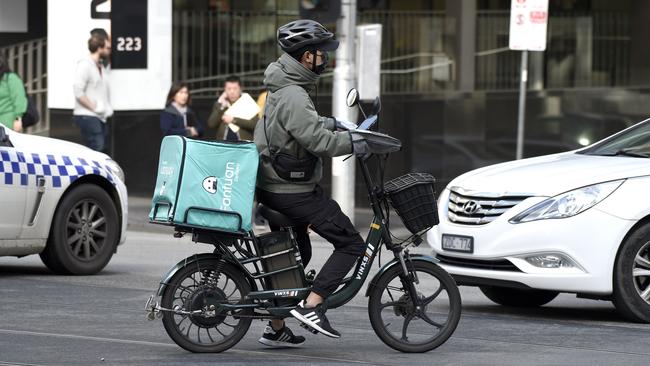Labor strikes deal on ‘right to disconnect,’ casuals and gig workers to pass IR bill
Labor has finalised a deal with crossbench Senators to pass its controversial industrial relation laws, which will include granting employees the right to ignore after hours work calls and emails.
National
Don't miss out on the headlines from National. Followed categories will be added to My News.
Australians will be granted the right to ignore after hours contact from their boss under a suite of controversial industrial relations changes slammed by businesses for adding unnecessary costs and complexity.
Giving workers the “right to disconnect” was among a range of concessions Labor agreed to in order to secure crossbench support for its Closing Loopholes bill, which is now expected to pass parliament on Thursday.
Employers have criticised the lack of consultation on the new right, and argued strongly against other proposed changes, including the introduction of a complex 12-factor test to define a casual employee, and a move to treat gig workers as “employee-like” giving them certain minimum standards.
Food delivery and rideshare apps have warned the changes will lead to higher costs for consumers, but Labor argued this would be a “small price to pay” for workers’ safety.
Independent Senator David Pocock secured a raft of amendments to Labor’s original bill, including delaying the new definition of a casual worker for six months to give businesses more time to navigate the extra red tape.

The government also agreed to simplify the process for converting a casual employee, and to allow businesses to refuse a worker’s request to go permanent on “fair and reasonable operational grounds”.
Mr Pocock said he would be co-sponsoring the amendments with Tasmanian Senator Jacqui Lambie, with changes to also include lifting the threshold for when a gig worker was considered “employee-like”.
“The changes the crossbench has negotiated make it a much simpler, fairer bill that preserves choice and flexibility,” he said.
“If you want to remain a casual you can, but if you want to convert to permanent there is now a better process for doing so while still preserving a businesses right to refuse on fair and reasonable grounds.”
After initially agreeing to a Greens request to legislate a “right to disconnect” that would result in employers being fined or contacting staff after hours, the amendment was walked back to instead give workers the right to “ignore” contact without penalty.

Business Council of Australia chief Bran Black welcomed crossbench efforts to minimise the “economic damage,” but said the changes still added “complexity, costs and red tape at the worst possible time”.
“The changes … don’t make the bill a good bill, but they will reduce some of the harm it would have otherwise caused,” he said.
“We have fought hard to minimise some of the negative changes to casual employment, including … providing businesses with fair and reasonable grounds to decline permanent employment.”

Council of Small Business Organisations Australia chief Luke Achterstraat said the overall bill would be a “challenge” despite the crossbench’s success on issues such as reducing uncertainty around the new definition of a casual worker.
“The right to disconnect provisions present huge risk to business in practical terms and should have been referred to a proper consultation … however removing civil penalties for small business and giving them greater time is logical,” he said.
Mr Achterstraat welcomed the governments' commitment to examine the various definitions of a small business.
“Moving forward, we need to have a proper conversation about how our industrial relations system can be improved to foster productivity and growth rather than erode it.”

Independent Senator Lidia Thorpe announced on Wednesday she would also vote for the bill after negotiating further protections for casual workers.
Ms Thorpe said her amendments would protect casual from being “punished” by their employer for requesting conversion to a permanent position, and ensure workers were informed about their rights.
“It also prevents casual fixed term contracts from being endlessly renewed or changed,” she said.

The Greens indicated their support after the “right to disconnect” amendment was agreed to.
“Australian workers today have a road to a new right, a right to turn off their phone and to turn on their attention to their family, to their health and to join many countries around the globe that have established a right to disconnect for workers in a universe where technology is very different,” Greens Senator Barbara Pocock said.
Employment and Workplace Relations Minister Tony Burke said the bill would “end the concept” of a “forced permanent casual” by providing a pathway for workers seeking to convert their employment status. Mr Burke also said the bill would introduce “world-leading” minimum standards for gig economy workers such as rideshare drivers and delivery riders.





